January 3, 2025 | 03:35 GMT +7
January 3, 2025 | 03:35 GMT +7
Hotline: 0913.378.918
January 3, 2025 | 03:35 GMT +7
Hotline: 0913.378.918
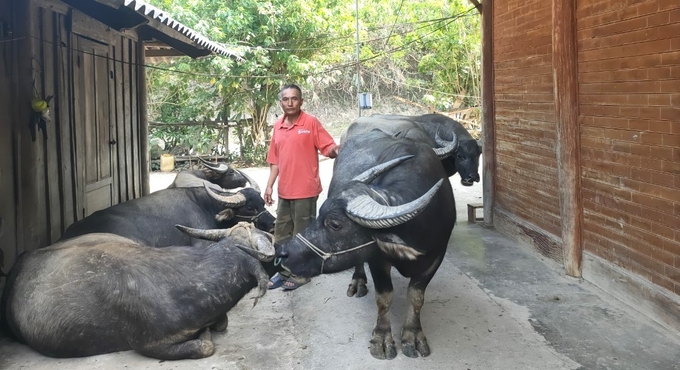
Moong Van Chun in Ky Son district is very confident in approaching the commercial livestock farming model thanks to the current complete and abundant livestock vaccine kit. Photo: Viet Khanh.
The Nam Can highland strip (Ky Son district, Nghe An) faces numerous challenges. This is the last point on National Highway 7, the road is long and difficult, the terrain and weather are unfavorable. These are major obstacles to the locality’s development. Considering the context, applying the traditional livestock farming model, which depends heavily on natural factors, is certainly not easy, and Nam Can is a prime example.
During its heyday, the buffalo and cow fattening business brought sky-high profits to the people here, with many households earning hundreds of billions of VND as easily as flipping their hands. Unfortunately, the market later plummeted, combined with risks from natural disasters and epidemics, pushing many households into poverty. Unable to cope with the situation, they were forced to quit.
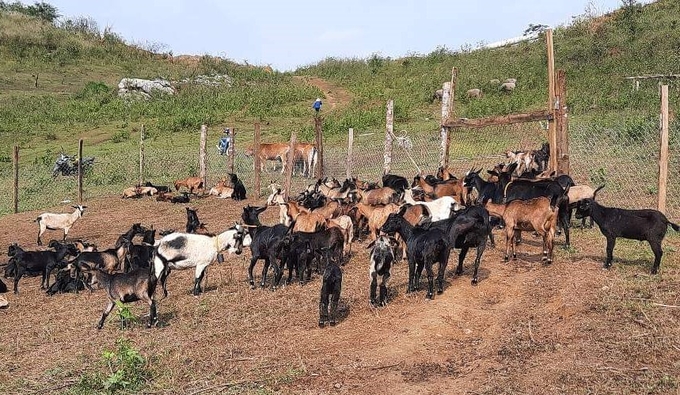
Raising goats brings Moong Van Chun big profits. Photo: Viet Khanh.
Unlike the majority, Moong Van Chun, a Khmu man residing in Khanh Thanh village, has maintained an astonishing level of stability in terms of livestock production. In any circumstance, this man still regularly earns high profits from his livestock. Avoiding being in a passive position, not only raising buffalo and cows, Chun has also proactively expanded his goat herd, identifying this as a key factor in the family’s economic development.
This choice was well-founded, stemming from the characteristics of being “suitable” for the steep mountainous terrain. There were not many people raising goats in Nam Can at that time, hence little competition. Chun was like a pioneer, quickly creating shortcuts and taking the lead. He quickly established a large enough purchasing system and network, so product consumption was never a concern.
It looked easy on the surface, but to build up the achievements like today was not a story done in just one or two days. The journey demands patience. At first, Chun only invested in raising... 2 female goats. Later, he continued to increase the herd in a very small amount.
By 2018, after a long enough period of care, realizing that the goat's physical condition was completely suitable for this land, especially almost immune to diseases when fully vaccinated, Chun decided to mobilize capital to go all-in, both expanding the scale and increasing the total herd exponentially, officially applying the commodity farming process from then on. The bold calculation brought sweet results. Just by raising goats alone, each year his family earned a net profit of hundreds of millions of VND.
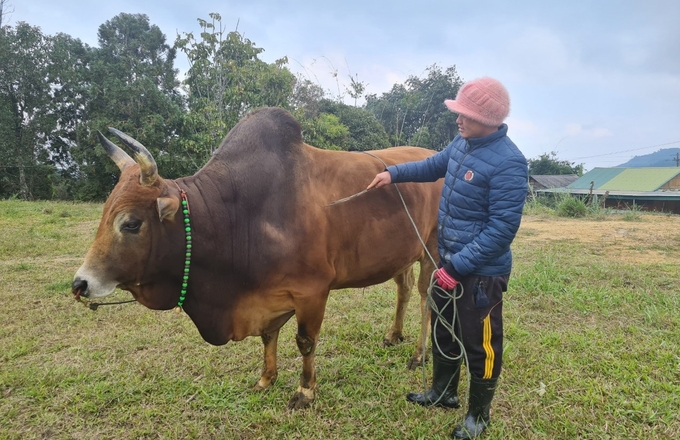
The majority of people in the mountainous areas do not take the initiative to get their livestock vaccinated, which is completely opposite to Chun. Photo: Viet Khanh.
From the achieved results, Chun’s family decides to reduce the rice growing area to concentrate land for developing commercial livestock farming. On a scale of 25 ha, he dedicates a part of the land to grow elephant grass to proactively feed buffalo and cows. The remaining area is zoned and fenced carefully for grazing purposes. The cattle enjoy a large environment so they grow quickly and achieve good quality.
Thanks to his resounding marks on the agricultural front, Moong Van Chun has been honored many times as a good farmer at all levels, and his important contributions to the community have been duly recognized by local authorities. Doing good on his part while spreading positivity to society, Chun basically excels in everything.
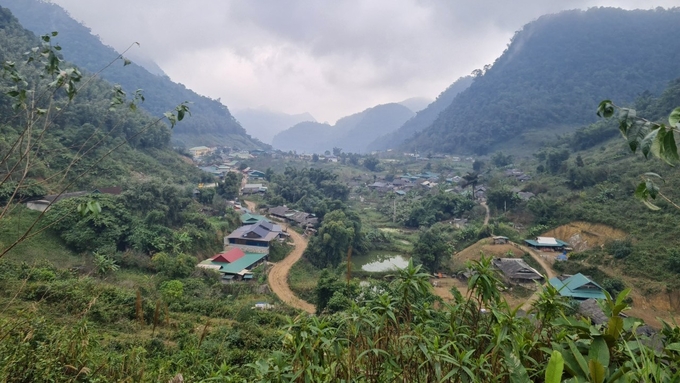
Moong Van Chun is the pride of Nam Can commune in particular and the Khmu ethnic group in general. Photo: Viet Khanh.
In reality, Chun’s introduction to his version of livestock farming model has directly created stable jobs for many local farmers. Every year, Chun helps poor households with capital, materials, and guides them on farming procedures and techniques, thereby creating motivation and confidence to overcome adversity.
“Since converting from traditional agricultural production to commercial livestock farming, Moong Van Chun has made a big difference in the locality. For Nam Can commune and the Khmu ethnic group, Chun is one of the notable spotlights,” said Tho Ba Re, Vice Chairman of the People's Committee of Ky Son commune.
Translated by Samuel Pham

(VAN) The Vietnamese trade counselor in the United States predicts a positive outlook for this market in early 2025 and recommends several solutions.

(VAN) China has approved five gene-edited crop varieties and 12 types of genetically modified (GM) soybean, corn and cotton, expanding approvals to boost high-yield crops, reduce import reliance, and ensure food security.

(VAN) The French Ambassador to Vietnam discussed the necessity of enhancing bilateral and multilateral collaboration to address climate change, particularly in the agricultural sector.

(VAN) On December 30, MARD and the International Livestock Research Institute (ILRI) held a consultation meeting to review the results of the CGIAR One Health Initiative as part of its project completion process.
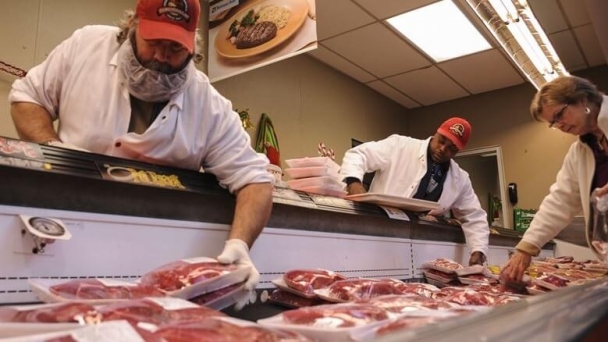
(VAN) The Asian country, the world’s largest beef buyer, will decide if a surge in shipments from overseas has hurt the domestic industry, the Ministry of Commerce said Friday.
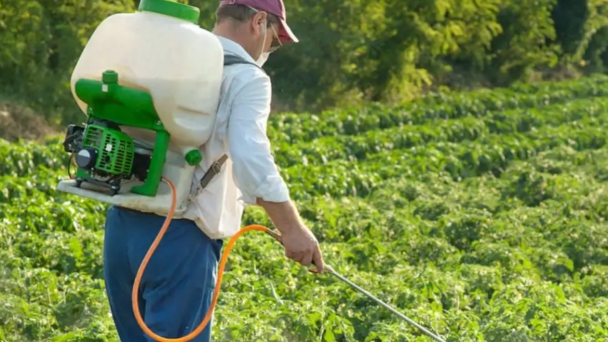
(VAN) The findings show that more extensive research on how pesticides impact the development and severity of various cancers is needed.
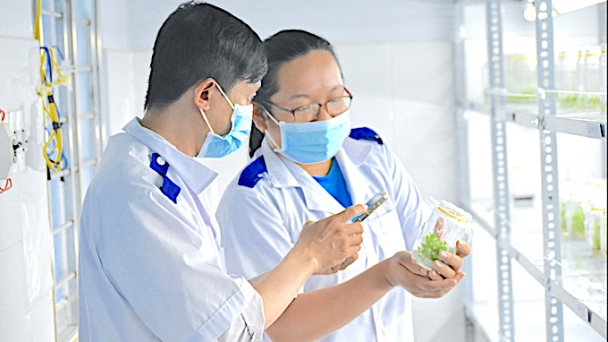
(VAN) The Ministry of Agriculture and Rural Development invests in a digital transformation research project for sustainable agriculture and climate change adaptation in the Mekong Delta.